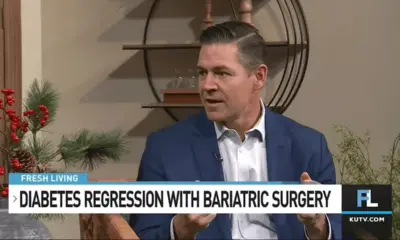Health
Researchers Launch New Tool to Enhance Access to Healthy Foods

A team of researchers from the Food is Medicine Institute at the Gerald J. and Dorothy R. Friedman School of Nutrition Science and Policy has developed a new screening tool aimed at assessing access to healthy food for Americans. Known as the Nutrition Security Screener (NSS), this tool represents a significant advancement in understanding not just food security but the broader concept of nutritional health.
The NSS is designed to complement existing measures of food security, which typically focus on the challenges individuals face in obtaining sufficient food resources. In contrast, the NSS specifically evaluates whether individuals can regularly access and consume nourishing foods that are essential for health maintenance and disease prevention. This nuanced approach aims to address critical gaps in current assessments of food access.
Understanding Nutrition Security
Food security has been a focal point for various health initiatives, particularly in the wake of the ongoing discussions surrounding public health and nutrition. The NSS takes this conversation further by emphasizing the quality of food available to individuals. Researchers argue that access to healthy food is just as vital as having enough food to eat.
In practical terms, the NSS is expected to provide health professionals and policymakers with detailed insights into the nutritional landscape in the United States. It identifies specific barriers that individuals may face in accessing healthy foods, including economic constraints, geographic location, and availability of food options. By focusing on these areas, the tool aims to inform strategies that can effectively enhance nutritional access across diverse populations.
The validation of this screening tool comes at a critical time, as many communities continue to grapple with health disparities exacerbated by socioeconomic factors. According to the United States Department of Agriculture, over 10.5% of households experienced food insecurity in 2021. The NSS could play a pivotal role in targeting interventions to those most in need.
Implications for Public Health
The introduction of the NSS is significant not only for individual health outcomes but also for broader public health initiatives. By identifying gaps in access to nourishing foods, health organizations can tailor programs that promote better dietary choices and improve overall community health.
Moreover, the NSS aligns with national efforts to combat diet-related diseases, which have seen a sharp increase in recent years. By focusing on nutrition security, the tool supports initiatives that aim to reduce rates of obesity, diabetes, and heart disease—conditions often linked to poor dietary habits.
As the conversation around food and health continues to evolve, tools like the Nutrition Security Screener will be crucial in shaping effective policies and interventions. Researchers at the Food is Medicine Institute emphasize the importance of addressing not only food availability but also the quality of that food to ensure healthier futures for all Americans.
In summary, the Nutrition Security Screener offers a new lens through which to view food access and nutritional health. With its comprehensive approach, it stands to enhance understanding and action in ensuring that all individuals have the opportunity to lead healthier lives through proper nutrition.
-

 Technology5 months ago
Technology5 months agoDiscover the Top 10 Calorie Counting Apps of 2025
-

 Health3 months ago
Health3 months agoBella Hadid Shares Health Update After Treatment for Lyme Disease
-

 Health3 months ago
Health3 months agoErin Bates Shares Recovery Update Following Sepsis Complications
-

 Technology4 months ago
Technology4 months agoDiscover How to Reverse Image Search Using ChatGPT Effortlessly
-

 Technology1 month ago
Technology1 month agoDiscover 2025’s Top GPUs for Exceptional 4K Gaming Performance
-

 Technology3 months ago
Technology3 months agoElectric Moto Influencer Surronster Arrested in Tijuana
-

 Technology5 months ago
Technology5 months agoMeta Initiates $60B AI Data Center Expansion, Starting in Ohio
-

 Technology5 months ago
Technology5 months agoRecovering a Suspended TikTok Account: A Step-by-Step Guide
-

 Health4 months ago
Health4 months agoTested: Rab Firewall Mountain Jacket Survives Harsh Conditions
-

 Lifestyle5 months ago
Lifestyle5 months agoBelton Family Reunites After Daughter Survives Hill Country Floods
-

 Health3 months ago
Health3 months agoAnalysts Project Stronger Growth for Apple’s iPhone 17 Lineup
-

 Technology4 months ago
Technology4 months agoHarmonic Launches AI Chatbot App to Transform Mathematical Reasoning





















